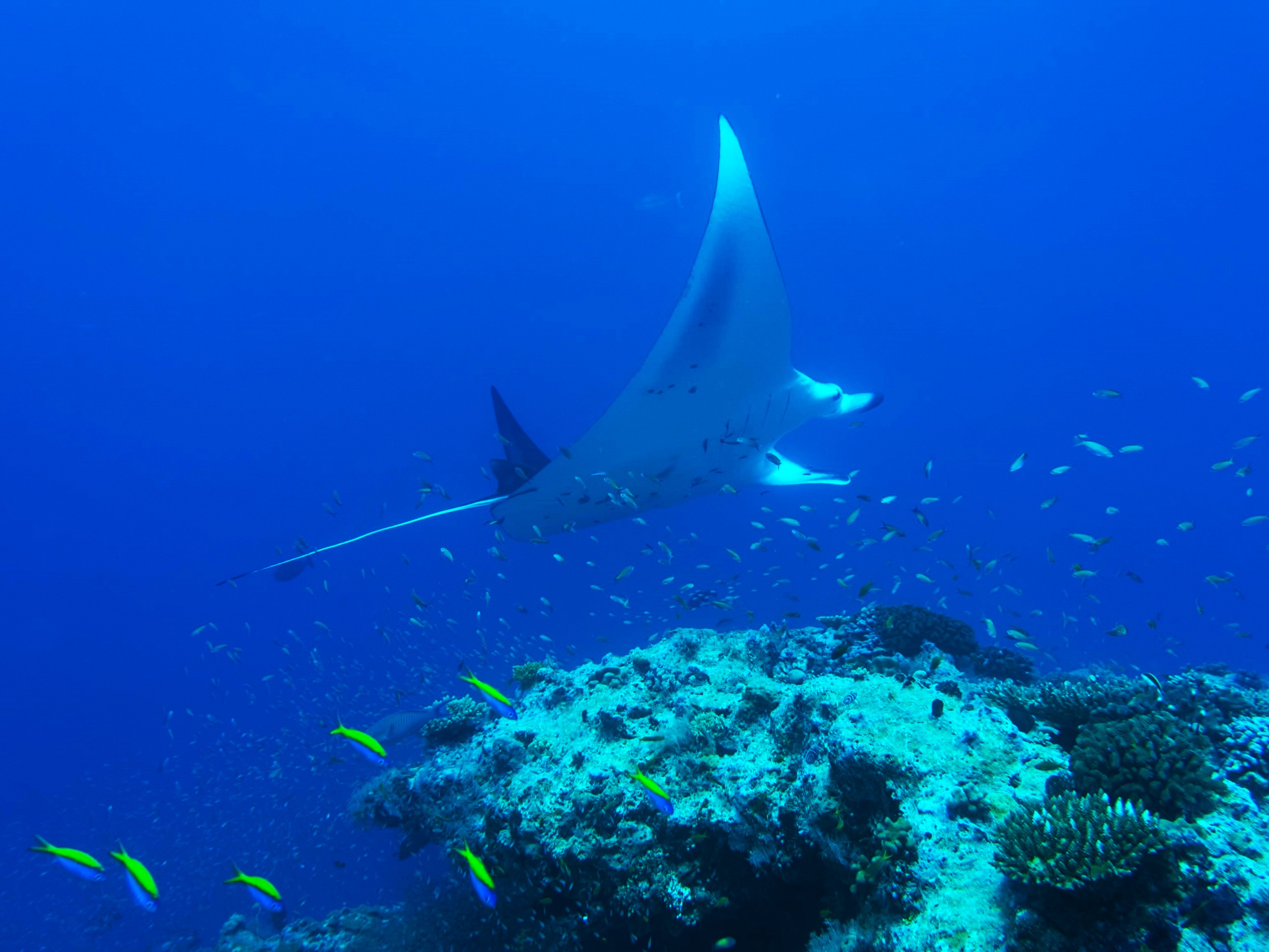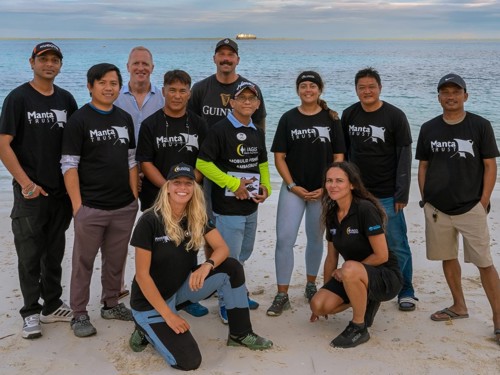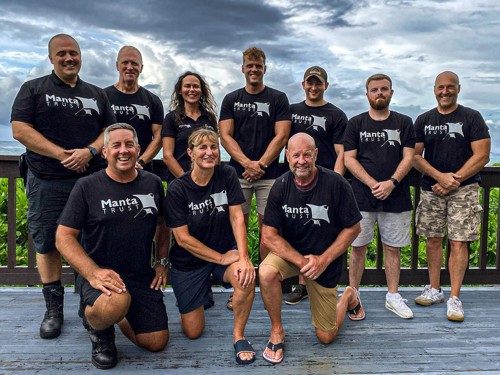Science, enforcement, and community

A reef manta ray (Mobula alfredi) observed at a cleaning station near Diego Garcia. Credit - Leila Scheltema, The Manta Trust.
Building conservation capacity in the Chagos Archipelago: The Mobulid Ambassador scheme
Manta and devil rays (mobulids) are filter-feeding elasmobranchs (a group of fish which includes sharks, rays, skates, and sawfish) that have experienced devastating declines due to exploitation for their gill plates driven by Asian medicinal trade. Gill plates are the modified filters that mobulids use to strain plankton and small fishes from the water when feeding.
The recovery of mobulid populations is hindered by slow growth, late maturation, and low fecundity (potential reproductive output of an individual). All ten species of mobulids are listed as Endangered or Vulnerable on the IUCN's Red List of Threatened Species, with some pending up-listings to Critically Endangered. This declining trend will lead to the local extinction of species, threatening marine biodiversity.
In the Chagos Archipelago, mobulids are currently protected by a vast (640,000 km²) no-take marine protected area (MPA). In 2024, the Chagos Manta Ray Project, part of the Manta Trust, officially documented three new devil ray species for the first time in the MPA (Harris et al., 2024).
Unfortunately, they also found that they were being fished illegally, which hadn’t been documented by enforcement authorities (Harris and Stevens, 2024). This gap in documentation existed because mobulid identification is a specialist skill held by only a few experts worldwide. However, limited catch recording is a significant barrier to effective management of these species, as developing conservation management strategies requires an understanding of how much mobulids are targeted, which relies on accurate catch data recording.
To address this issue, the Chagos Manta Ray Project designed a new approach in collaboration with US and UK military personnel, the Foreign, Commonwealth and Development Office, Marine Resources Assessment Group, and Senior Fisheries Protection Officers. Named the Mobulid Ambassador Scheme, this scheme trained personnel on Diego Garcia, the archipelago’s only inhabited island and a UK - U.S. military base, in identifying mobulid species in illegal fishing catches and collecting live sighting data.
Mobulid Ambassadors were recruited from across the island’s diverse community through outreach events attended by over 260 people. Forty-four participants completed specialised identification workshops. These covered mobulid species recognition, gill plate identification, anatomy, and standardised data collection protocols.
 Nine of the first twelve Mobulid Ambassadors appointed in December 2024, following completion of the training workshops in Diego Garcia, Chagos Archipelago. Credit - Leila Scheltema, The Manta Trust.
Nine of the first twelve Mobulid Ambassadors appointed in December 2024, following completion of the training workshops in Diego Garcia, Chagos Archipelago. Credit - Leila Scheltema, The Manta Trust.
 Nine Royal Overseas Police Officers formally appointed as Mobulid Ambassadors in March 2025 in Diego Garcia, Chagos Archipelago. Credit - Joanna Harris, The Manta Trust.
Nine Royal Overseas Police Officers formally appointed as Mobulid Ambassadors in March 2025 in Diego Garcia, Chagos Archipelago. Credit - Joanna Harris, The Manta Trust.
Twenty participants from various sectors were appointed as Mobulid Ambassadors. These included enforcement personnel, long-term contractors from the Philippines and India, and short-term residents from the UK and US military, FCDO, and Royal Overseas Police Officers. All now actively report both catch data and live sightings. Their contributions have supported enforcement operations and community outreach, resulting in the documentation of over 140 verified live sightings, while also enhancing coordination between frontline personnel and management authorities. This approach provided continuity in data collection despite the high turnover of personnel in the region. The Mobulid Ambassadors became a bridge between science, enforcement, and community life, ensuring that skills and knowledge remained in place long after the project concluded.
One of the most significant impacts of the Mobulid Ambassador Scheme is its enduring influence. Ambassadors continue to contribute data and support enforcement operations, with remote mentoring provided by the Chagos Manta Ray Project. The data generated is already informing MPA management planning and will feed into regional and international conservation frameworks.
The Mobulid Ambassador Scheme demonstrates the value of Darwin Plus funding, which supported targeted training, strong partnerships, and creative outreach that delivered meaningful and lasting national impact. In the Chagos Archipelago, where mobulid rays face continued pressure from illegal fishing, this project has established a foundation for long-term monitoring, enforcement, and community engagement. Its lasting impact lies not only in the data collected and the people empowered to protect these extraordinary animals, but also in a scalable model of conservation capacity-building that can be replicated across regions.
Written by Joanna L. Harris. For more information on this Darwin Plus Local project DPL00063, led by Manta Trust, please click here.

 Back
Back